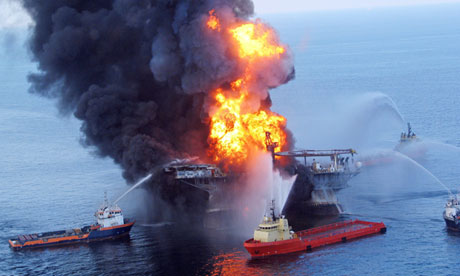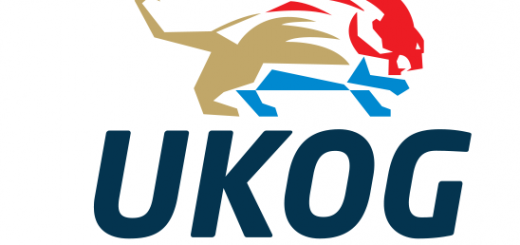 The owner of the Deepwater Horizon rig has finally owned up to playing a part in the Gulf of Mexico disaster after reaching a 1.4 billion-dollar settlement with the US Department of Justice. Transocean owned the rig hired by BP, which exploded in April 2010, killing 11 workers and causing the biggest oil spill in US history. The Switzerland-based company had, until now, refused to bear any responsibility for the disaster, trying instead to pin all the blame on BP and its other contractors. Transocean yesterday pleaded guilty to violating the Clean Water Act by failing to properly monitor the doomed Macondo well, which BP tried to plug after drilling on April 20, 2010. A massive build-up of pressure inside the well resulted in a blow-out after a surge of methane gas caused an explosion on the rig. [The Times]
The owner of the Deepwater Horizon rig has finally owned up to playing a part in the Gulf of Mexico disaster after reaching a 1.4 billion-dollar settlement with the US Department of Justice. Transocean owned the rig hired by BP, which exploded in April 2010, killing 11 workers and causing the biggest oil spill in US history. The Switzerland-based company had, until now, refused to bear any responsibility for the disaster, trying instead to pin all the blame on BP and its other contractors. Transocean yesterday pleaded guilty to violating the Clean Water Act by failing to properly monitor the doomed Macondo well, which BP tried to plug after drilling on April 20, 2010. A massive build-up of pressure inside the well resulted in a blow-out after a surge of methane gas caused an explosion on the rig. [The Times]
Officials at the US Federal Reserve are split on whether to keep buying assets until the end of 2013, according to the minutes of their December meeting. The minutes show the new front line for debate on the rate-setting Federal Open Market Committee and give the first indication of how big the Fed’s third round of quantitative easing – so-called QE3 – may be in total. If the Fed keeps buying at the current pace of $85bn a month for the rest of 2013, it would accumulate another $1tn in long-term assets. [Financial Times]
Twitter is preparing to take the company public in 2014, and could already be worth as much as $11bn, according to a report by specialist financial researchers Greencrest. The rough valuation of $11bn is based on trading in secondary markets, where shares unofficially trade hands privately. But a funding round in 2011 valued Twitter at $8bn, after which the value rose to $10bn on secondary markets before Facebook’s shambolic IPO pushed the value back down to $9bn. [The Guardian]
International Airlines Group, the owner of British Airways and Iberia, could escape strikes and other industrial action after the Spanish pilots’ union agreed to talks on restructuring Iberia by axing staff and cutting salaries. Willie Walsh, the chief executive of IAG, plans to cut more than 4,000 jobs, a fifth of Iberia’s workforce, sell off planes and reduce routes. [The Independent]
A small oil and gas technology company conceived in an Oxford University laboratory has attracted the interest and the cash of Roman Abramovich. The Russian billionaire and Chelsea Football Club owner is understood to have injected more than £4.3 million into Oxford Catalysts, an AIM-quoted company that raised £30.6 million in a share issue yesterday. His participation in the business, with a stake of more than 3 per cent, is expected to be announced this morning. He joins the University of Oxford as an investor in a company that was originally spun out of a chemical discovery in a college laboratory. The university already had a 2.5 per cent stake, but it is not yet known if it bought more in the share placing. [The Times]
The share of euros in the world’s rising powers’ reserve holdings has fallen to its lowest level since 2002, dashing hopes that the single currency will soon challenge the US dollar for global primacy. International Monetary Fund data show that emerging nations have cut the weighting of EMU bonds in their reserves to 24.7pc from a peak of 30pc at the onset of Europe’s crisis three years ago, with a record drop in the third quarter of 2012. [The Telegraph]
The financier Nat Rothschild has escalated his row with the board of Bumi, after claiming that the latest results from a key subsidiary of the Indonesian coal miner he co-founded lacked credibility. Bumi Resources, in which the parent company Bumi owns a 29 per cent stake, announced a $632m (£388m) loss for the first nine months of 2012, compared with a $175m profit a year earlier. [The Independent]
Qatar-based broadcaster Al-Jazeera has upped its presence in America by buying the struggling cable channel founded by former US vice-president Al Gore. Al-Jazeera said it would use the acquisition of Current TV to launch a new US-based news channel. The deal means Al-Jazeera will be available in more than 40 million US households, up from 4.7 million previously. The group said its latest New York-based news channel would be separate from al-Jazeera English, and would provide both domestic and international news for American audiences. It will launch later this year. The terms of the sale were not disclosed, but analysts estimated Current could be worth as much as $500 million (£310m). [The Scotsman]


